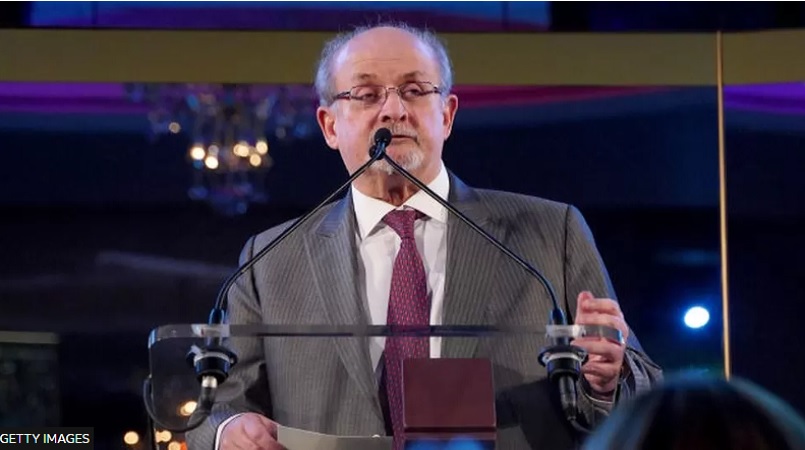
Author Salman Rushdie, who suffered years of Islamist death threats after writing The Satanic Verses, has been stabbed on stage in New York state.
The Booker Prize winner, 75, was speaking at an event at the Chautauqua Institution at the time.
New York State Police said a man ran up onto the stage and attacked Mr Rushdie and an interviewer.
Police detained a suspect named as Hadi Matar, 24, from Fairview, New Jersey.
No motive or charges have yet been confirmed by police.
Mr Rushdie was stabbed at least once in the neck, and at least once in the abdomen. He was taken to a hospital in Erie, Pennsylvania, by helicopter.
The writer has been undergoing surgery, police and his agent confirmed.
The interviewer who was also on stage, Henry Reese, suffered a minor head injury and was taken to a local hospital. Mr Reese is the co-founder of a non-profit that provides sanctuary to writers exiled under threat of persecution.
Police told a press conference that staff and audience members had rushed the attacker and took him to the ground, and he was then arrested.
A video posted online shows the moment people dashed onto the stage immediately after the incident, and police said a doctor in the audience gave Mr Rushdie first aid.
Indian-born novelist Mr Rushdie catapulted to fame with Midnight's Children in 1981, which went on to sell over one million copies in the UK alone.
But his fourth book, in 1988 - The Satanic Verses - forced him into hiding for nine years.
The surrealist, post-modern novel sparked outrage among some Muslims, who considered its content to be blasphemous, and was banned in some countries.
A year after the book's release, Iran's Supreme Leader Ayatollah Khomeini called for Mr Rushdie's execution. He offered a $3m (£2.5m) reward in a fatwa - a legal decree issued by an Islamic religious leader.
The bounty over Mr Rushdie's head remains active, and although Iran's government has distanced itself from Khomeini's decree, a quasi-official Iranian religious foundation added a further $500,000 to the reward in 2012.
The British-American citizen - who was born to non-practising Muslims and is an atheist himself - has become a vocal advocate for freedom of expression, defending his work on several occasions.
